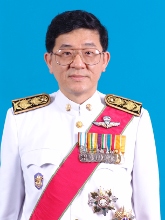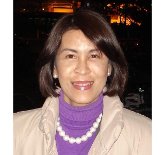
Name: KUA WONGBOONSIN
Institution: College of Population Studies, Chulalongkorn University
Brief Self Introduction
Prof. Dr. KUA WONGBOONSIN obtained his A.M. and Ph.D. from the University of Pennsylvania. His fields of expertise include Demographic Analysis, Population and DevelopmentHe is a faculty member of the College of Population Studies, and Vice-President for Research Affairs, Chulalongkorn University. During 1990s, he took directorship at the Institute of Population Studies, a former name of the College of Population Studies. He is member of these professional societies: The Thai Population Association (Member, President 1995-2000); The Social Science Association of Thailand; Population Association of America; IUSSP.
Main Publications
Patcharawalai Wongboonsin and Kua Wongboonsin.2006. “Modern Population Trends and the Family: The Southeast Asian Example.” In A. Scott Loveless and Thomas B. Holman (Editors). The Family in the New Millennium: World Voices Supporting the ‘National’ Clan. Westport, Connecticut: Praeger Publishers. Chapter 9, pages 153-162.
Kua Wongboonsin, Philip Guest and Vipan Prachuabmoh, 2005. “Demographic Change and the Demographic Dividend in Thailand”. Asian Population Studies, 1(2), 245-256.
Kua Wongboonsin and Guest P, Eds. 2005. The Demographic Dividend: Policy Options for Asia. Bangkok: College of Population Studies, Chulalongkorn University; Asian Development Research Forum; and the Thailand Research Fund.
Kua Wongboonsin and Patcharawalai Wongboonsin. To Reposition Thailand via Effective Vocation Education in Response to Changing Needs in the Globalization Era. Paper presented at the APEC Forum on Human Resources Development 2003 “Effective Technical and Vocational Education and Training (TVET) in Response to the Changing Needs due to Technological Innovation and Globalization”. Chiba, Japan, 4-6 February 2004.
Kua Wongboonsin, Chintana Pejaranonda, Preeya Mithranon, Suwanee Surasiengsunk and Kitti Limsakul, 2003. Population Projections for Thailand 2000-2025: Implications for Population Policy in the Future. CPS Publication No. 293/03 Bangkok: College of Population Studies, Chulalongkorn University. (in Thai).

Name: Patcharawalai WONGBOONSIN
Institution: College of Population Studies, Chulalongkorn University
Brief Self Introduction
Prof. Dr. PATCHARAWALAI WONGBOONSIN obtained her A.M. from the University of Pennsylvania and Ph.D. from Kyushu University, Japan. Her fields of expertise include Population and Development, Human Development, Human Security, and Migration. She is a faculty member of the College of Population Studies, Chulalongkorn University, Executive Board of the Institute of Asian Studies, Chulalongkorn University, Asian Review Editor-in-Chief, Asia Trend Editor-in-Chief, East Asian Economic Cooperation Council member, Deputy Director of the European Studies Center in Thailand, and Representative of Thailand to Network of East Asian Think Tank. She also served as Advisor to Thai Delegates, ASEAN Inter-Parliamentary Organization.
Main Publications
Maximizing Competence of ASEAN Workforce “Comparative Migration Policies in the ESCAP Region.” pp. 67-95. In Migration Patterns and Policies in the Asian and Pacific Region Asian Population Studies Series No. 160, Economic and Social Commission for Asia and the Pacific, New York: United Nations. 2003
ASEAN経済共同体に向けて—サービスに関する枠組み協定(AFAS)の下におけるサービス 貿易自由化に対するASEANのコミットメントの分析—(Regional Studies) Vol. 32 No. 2 March 2005 published by The Institute for Regional Studies, The International University of Kagoshima, Japan. The latter was translated from her article entitled “ASEAN Liberalization of Trade in Services: ASEAN Commitment under AFAS.”
“Maximizing the Demographic Dividend via Regional Cooperation in Human Resource Development,” pp. 90-128. In Kua Wongboonsin and Philip Guest (Editors). The Demographic Dividend: Policy Options for Asia. Published jointly by College of Population Studies, Chulalongkorn University, Asian Development Research Forum, and Thailand Research Fund in cooperation with International Development Research Centre, Canada. Bangkok: Chulalongkorn University Printing House, 2005.
“Asian Labour Migration and Regional Arrangements,” pp. 201-217. In Kristof Tamas and Joakim Palme (Editors). Globalizing Migration Regimes: New Challenges to Transnational Cooperation. Hampshire, UK: Ashgate Publishing, 2006.
“The State and Labour Migration Policies in Thailand,” pp.248-273 In Amarjit Kaur and Ian Metcalfe (Editors). Mobility, Labour Migration and Border Controls in Asia Hampshire,UK: Palgrave Macmillan, 2006
Introduction of Overseas Partners’ Institution
Chulalongkorn University was the first comprehensive university in Thailand. The university was originally established in 1871 as the Royal Page School in the reign of King Chulalongkorn or King Rama V. The school was founded with the objective to produce scholars to serve the King in the government service. The university has since provided equal opportunities in higher education for all Thai people as this was the intention of King Chulalongkorn as reflected in his royal words: “All of our subjects, be they royals, nobles, or commoners, will have the same opportunity to study”. This intention was adopted by his son, King Vajiravuth or King Rama VI, who founded the Kingdom’s first university in 1917 and named it Chulalongkorn University in honour of his father. Since the university’s inception, it has maintained a reputation for excellence in its academic standards. Further information can be obtained from www.chula.ac.th.
At Chulalongkorn University, the College of Population Studies was established in early 1966 as an autonomous research and training unit of Chulalongkorn University. It was then called the Population Research and Training Center up to 1970, when the name was changed to the Institute of Population Studies (IPS) by a royal Decree to confer a higher status. In order to serve the rapid changes in socio-economic and demographic trends in both research and training aspects, the Institute was once again upgraded in status by a Royal Decree to become "the College of Population Studies" in November 1998. The College of Population Studies is offering a Master’s and Ph.D. programs in Demography. Courses are delivered in Thai language. It is in the process of planning for an international program at the Ph.D. level, in collaboration with its international network. The College also provides population information and consultation to government and private organizations; publishing a population newsletter and journal, research reports, and related articles, and distributing them to the public. Further information can be obtained from www.cps.chula.ac.th.






































 記事投稿
記事投稿







